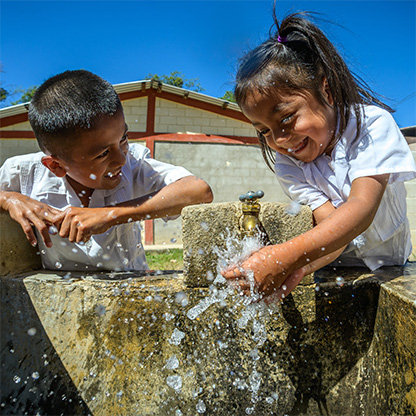Global Water Point

Recommended Price $500
Help us bring the life-saving gift of clean water to the children and families who need it most. The global water crisis is one of the biggest public health crises of our day. The global water crisis also disproportionately impacts...
More DetailsHelp us bring the life-saving gift of clean water to the children and families who need it most.
The global water crisis is one of the biggest public health crises of our day. The global water crisis also disproportionately impacts women and girls, who spend more than 200 million hours hauling water every day.
Every day, more than 1,000 children under 5, die from diseases related to lack of safe water, sanitation, and hygiene. 1 of every 11 people on the planet have no access to clean water—that’s 703 million people who lack basic drinking water access, with 122 million people still using surface water as their source.
The global water crisis also disproportionately impacts women and girls, who spend an estimated 200 million hours hauling water every day.
World Vision is also the leading nongovernmental provider of clean water in the developing world. Every 10 seconds World Vision reaches one new person with clean water and hygiene education! We are committed to reach 30 million people with access to clean water between 2022-2030, including finishing the job of ensuring clean water for everyone, everywhere we work in Honduras and Zambia.
What is a water point?
World Vision determines the type of water point to provide in a community based on an assessment of what will be most sustainable, cost-effective and based on the available water sources. Types of water points may include a water kiosk in a community, a hand-pump well, or a solar-powered system. The water may be provided through a borehole drilled by a drilling rig. Or, it may be provided by a water source such as a protected spring and then a piped water system running into a community. Each water system is either protected or treated to ensure it is safe for users to drink.
Our standard is to ensure that every community member has access to water within 30 minutes roundtrip of their home, including the waiting time at the water point. This means that the number of water points we have in a specific area will vary by population and geography. On average, we estimate about 200-300 people are served by each water point. Therefore, depending on the yield of the system, many thousands of people could be served by one complete system.
An independent study funded by the Conrad N. Hilton Foundation and conducted by the University of North Carolina Water Institute in the Greater Afram Plains region of Ghana showed that nearly 80% of wells installed by World Vision were still functioning at high levels after nearly two decades. In contrast, previous studies have shown that 30% to 50% of non–World Vision-installed wells are not repaired when they inevitably break down. The reason for this high level of success is that we work with communities to ensure they own the water points and are able to fix them when they break down.
When you give a gift of $15,000 to our water point work, we will report back to you to show you the impact that your donation is making by providing a report of a specific water point that you have helped fund. The report will include a photo of a water point with GPS coordinates, and the number of people who have benefited.
We will typically be able to provide the report in 6 to 9 months.
“…I was thirsty and you gave me something to drink…” —Matthew 25:35 (NIV)
Our Commitment
Your gift is a sacred trust. We promise to honor your generosity by using your donation in the most effective way possible. Giving options represent World Vision projects and suggested donation amounts are based on surveys in the countries where we serve. Your donation will be used to provide assistance where it's needed most with the gift category. For example, when you give an animal gift, a portion of the gift may also help provide water sources, farming assistance, hunger relief, and other related essentials.
The multiplying effect from grants and donated goods may change throughout the year on identical or similar offers due to variations in the start and end dates of donor grants and our programs.